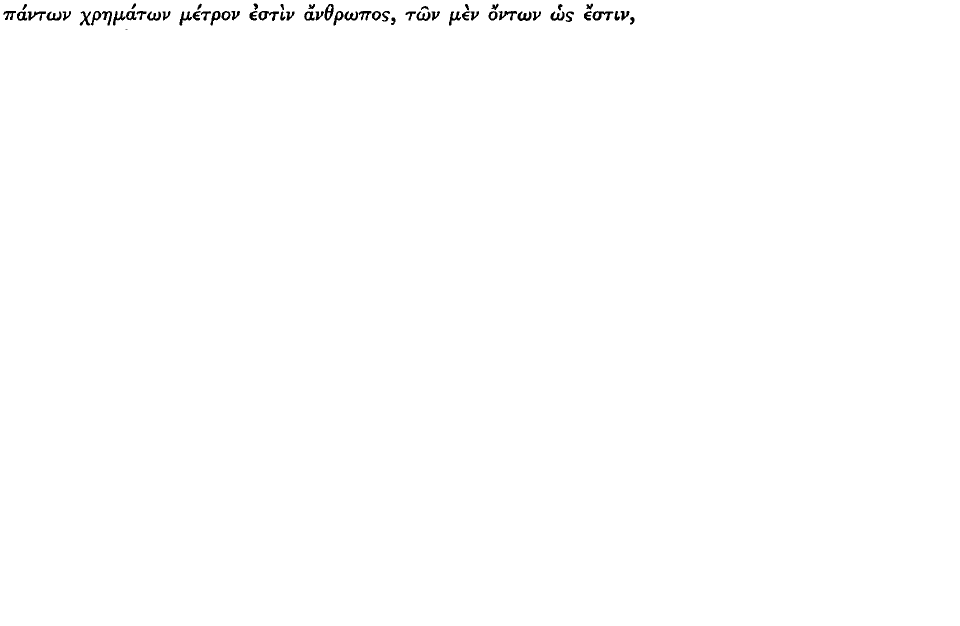Published online by Cambridge University Press: 11 February 2009
A Fragment of ancient philosophy is like a code message which it is the task of the scholar to decipher. The cryptogram has come down to us, but not the key. In case this beginning should be thought obvious by anyone, let me say at once that I do not believe a word of it, though I believe that the attitude it epitomizes is by no means uncommon and is part of the explanation of a tendency to mishandle philosophical fragments. The attitude is to be found, for example, in some things M. Untersteiner has said in his recently translated book on the Sophists1 about the meaning of the well-known statement of Protagoras: 

page 215 note 1 Sofisti (Giulio Einaudieditore, 1949) = The Sophists, trans. Freeman (Blackwell, 1954). My quotations in English are from Dr. Freeman's version throughout.
page 215 note 2 ‘la traduzione’, p. 55 (Freeman, p. 42). Of course it is not a translation at all. For in the first place the expression ‘dominatore di tutte le esperienze’ is lacking in any obvious sense, whereas the Greek it is alleged to represent has an obvious sense; in the second place the expressions ‘fenomenalità di quanta é reale’ and ‘nessuna fenomenalità di quanto é privo di realtà’ are intrusions of quasi-Kantian jargon.
page 215 note 3 Excursus al capitolo III, p. 96 (Freeman, p.77).Google Scholar
page 215 note 4 Thus, ‘Questo valore verbale di  “dominio su qualchecosa” mi sembra essere fondamentale’: p. 103 (Freeman, p. 81).
“dominio su qualchecosa” mi sembra essere fondamentale’: p. 103 (Freeman, p. 81).
page 217 note 1 We do not know the meaning of the statement ‘the key of B flat is blue’ until its use has been explained to us. If anyone should think there could be no conceivable use for it, let him consider this example: Johnson has found by experience that whenever he hears a piece of music played in B flat a blue colour-image presents itself to him, or else the contents of his field of vision take on a bluish tinge. Other colours associate themselves in a similar fashion with other keys. Johnson has no sense of perfect pitch, but now he is able to tell the key of any piece of music he hears without verifying it on the piano or looking at the score. His friends are astonished. He tells them that the key of B flat is blue; but they cannot, of course, understand him—until he explains all this to them, i.e. explains how the statement is being used.
page 217 note 2 ‘He is the measure’, we can add, ‘both of what is and of what is not the case.’
page 219 note 1 ‘Therefore the idea cannot have been strange to him. If he did not mention it, it was not because he did not know of  , but because he, with his usual originality, substitutes for
, but because he, with his usual originality, substitutes for  the expression
the expression  by which he means that ‘Man is the completion, therefore the master, of experiences’. Protagoras frees himself from
by which he means that ‘Man is the completion, therefore the master, of experiences’. Protagoras frees himself from  which he understood as (the) insane strife. … ’
which he understood as (the) insane strife. … ’
page 219 note 2 ‘Who believed philosophy to consist in  A precept for life is therefore the mastery
A precept for life is therefore the mastery  over
over 
page 220 note 1 See p. ioo (Freeman, p. 79).
page 220 note 2 The sentiment 
 bears itself awkwardly in the guise of 'e tu, sia che lo voglia, sia che non lo voglia, devi sopportare di essere un dominatore
bears itself awkwardly in the guise of 'e tu, sia che lo voglia, sia che non lo voglia, devi sopportare di essere un dominatore  ’. Why should ‘being a master’ be asserted to be something ‘you must put up wim’ ? Perhaps the oddness of this was felt by Untersteiner himself, for he deemed it necessary to append the Greek word in brackets (p. 68). Dr. Freeman here adds something on her own account—amusingly, to my mind (Freeman, p. 53).
’. Why should ‘being a master’ be asserted to be something ‘you must put up wim’ ? Perhaps the oddness of this was felt by Untersteiner himself, for he deemed it necessary to append the Greek word in brackets (p. 68). Dr. Freeman here adds something on her own account—amusingly, to my mind (Freeman, p. 53).